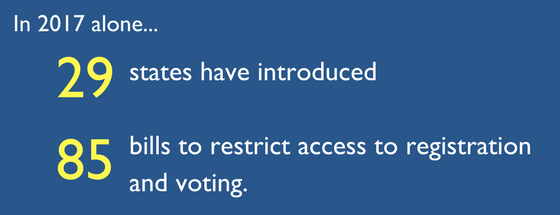This week, members of the New Hampshire House Election Law Committee heard public testimony on a new bill that would impose new proof of residency requirements on voters attempting to register within 30 days of an election. New Hampshire is just one of the 29 states this year that have introduced a total of more than 85 bills restricting access to registration and voting.
Recent actions by the current presidential administration have laid the groundwork for this flurry of voter restrictions. Since before he assumed office, President Trump has claimed, without evidence, that millions of illegal votes were cast in the 2016 election. After assuming office, Trump said he would call for a task force - led by Vice President Mike Pence - to investigate the issue of voter fraud.
In reality, studies have proven that there is no evidence of widespread voter fraud, and both Republicans and Democrats have outwardly stated that it is not a problem in our democracy. Meanwhile, the Department of Justice’s (DOJ) recent withdrawal of its discriminatory intent claim in the Texas voter ID case is a signal to states that this DOJ will not vigorously enforce the Voting Rights Act.
Though Trump’s voter fraud investigation has not materialized, more states have seized this moment to pass restrictive voting laws that supposedly target (nearly nonexistent) in-person voter fraud. Indeed, lawmakers are seizing on the mere “perception” of voter fraud—created by supporters of voter ID laws and amplified by the President’s recent statements—to justify voting restrictions. Thus, state legislators continue to introduce and push voting restrictions despite numerous rulings last year—in Texas, North Carolina, Wisconsin, and North Dakota—striking down many such laws as discriminatory and unduly burdensome. Rather than refocusing their energies of electoral modernization measures—which could expand and improve our electoral system—legislators in many states have doubled down on voter restrictions, tweaking them slightly in hopes of judicial approval.
Under the New Hampshire bill, which has already passed the state Senate, new voters registering within 30 days are required to provide additional documentation of their residency. Documentation requirements for registration have a demonstrable negative impact on successful registration rates. And while individuals who do not have proper proof of residency may still vote if they sign an affidavit swearing to provide proper evidence of their domicile to the town clerk within 10 or 30 days of the election, they may face criminal penalties if they fail to provide that follow-up documentation, even if they are actually eligible to vote.
In Arkansas, after the state Supreme Court struck down the state’s voter ID law in 2014, lawmakers have taken a two-pronged approach to impose a voter ID requirement anyway. First, the state legislature voted to put on the 2018 ballot a proposed constitutional amendment requiring the General Assembly to enact a voter ID law. Second, now that four of the seven judges who struck down the prior law are no longer on the court, Arkansas passed a nearly identical voter ID law in hopes that the new majority will reverse the Court’s prior opinion.
In September, a federal judge temporarily ordered North Dakota to allow voters lacking the required forms of photo ID to sign an affidavit swearing that they are eligible to vote and vote a regular ballot. Lawmakers had previously repealed portions of the law allowing voters to sign affidavits and to use more types of identification. In April, the North Dakota Legislature passed a bill again altering the voter ID law so that voters who do not have a proper ID may only cast a ballot that is set aside in a sealed envelope until the voters can confirm their eligibility by showing an election official one of the required forms of ID within six days.
These are just a few of the ways in which states are hoping to skirt judicial rulings striking down discriminatory voting laws, forcing further costly and time-consuming legal challenges to voting restrictions, and creating new obstacles to the franchise.
In August 2016, The Washington Post Editorial Board wrote that U.S. federal courts were “turning back the tide” on voter suppression measures. Unfortunately, these measures demonstrate that legislators remain steadfast in their resolve to legislate against the right to vote despite court admonitions. Where appropriate, organizations like the Campaign Legal Center and our partners will continue to hold legislators accountable in court.
Regardless of whether these restrictions pass constitutional muster, citizens should demand that our legislators focus their resources on expanding and modernizing, rather than limiting, access to the franchise.
